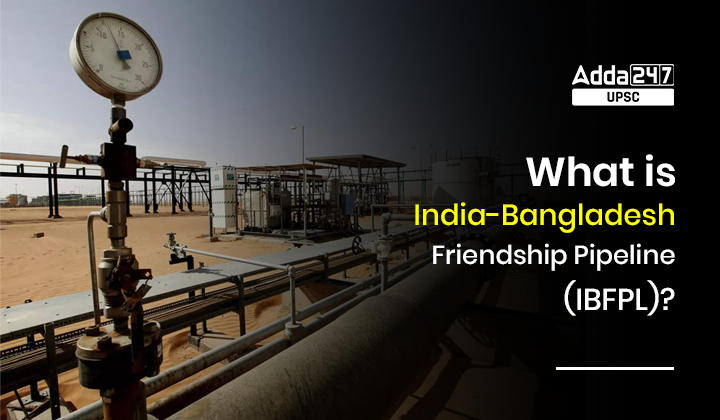Table of Contents
Significance of India-Bangladesh Friendship Pipeline (IBFPL) for UPSC
India-Bangladesh Friendship Pipeline (IBFPL) is important for the current affairs section of the UPSC prelims exam 2023.
India-Bangladesh Friendship Pipeline (IBFPL) is also a significant issue for UPSC Mains GS 2 Syllabus: India and its Neighborhood, Bilateral Groupings & Agreements, Groupings & Agreements Involving India and/or Affecting India’s Interests.
Why is India-Bangladesh Friendship Pipeline (IBFPL) in news?
- Recently, Bangladesh Prime Minister Sheikh Hasina expressed hope to import oil from India by 2023 through a proposed India-Bangladesh Friendship Pipeline (IBFPL) project.
- She made the remarks on Sunday i.e. November 20, 2022, during a meeting with the Speaker of the Assam Legislative Assembly Biswajit Daimary at her official Ganabhaban residence in Dhaka.
Background of India-Bangladesh Friendship Pipeline (IBFPL)
- Indian Prime Minister Narendra Modi and Bangladesh’s Prime Minister Sheikh Hasina inaugurated construction work for the 130-kilometer (80.7-mile) India-Bangladesh Friendship Pipeline (IBFPL) project on Sept. 18, 2018, to facilitate the transportation of imported fuel oil and reduce its transport costs for Bangladesh.
- The project was targeted for completion by December this year. In September, officials of both countries assured that over 90% of the project had been completed.
What is India-Bangladesh Friendship Pipeline (IBFPL)?
- The 130-km India-Bangladesh Friendship Pipeline (IBFPL) project aims to import oil products from the Siliguri Marketing Terminal in West Bengal.
- As currently, fuel oil imported by Bangladesh is first unloaded from ships at the country’s main seaport in Chattogram district and then transported to other parts of the country by tankers, which is time-consuming and costlier.
- India-Bangladesh Friendship Pipeline (IBFPL) project will enable fuel oil products to be exported from India’s Siliguri Marketing Terminal in West Bengal State to Bangladesh.
- The IBFPP will export fuel from Assam-based Numaligarh Refinery Limited (NRL) via the Siliguri Marketing Terminal to Bangladesh.
- The capacity of the 130km oil pipeline will be one million metric tonnes per annum.
- According to the Dhaka-Delhi agreement, fuel oil would be transported for 15 years through the pipeline in the first phase and the term would be extended on the consensus of the countries.
- In the wake of a fuel crisis in Bangladesh, the project is expected to boost long-term business growth and bilateral ties between the two countries.
Way forward
- There has been a steady increase in bilateral trade between India-Bangladesh.
- In 2020, there was a year-on-year increase of 14%, which is a very encouraging figure to attain.
- Bangladesh’s exports to India crossed the billion-dollar mark and it continues to increase on a very steady basis.
- In 2021-22, Bangladesh has emerged as the largest trade partner for India in South Asia and the fourth largest destination for Indian exports worldwide.
- As the two sides are also in talks for a Comprehensive Economic Partnership Agreement.
FAQs on India-Bangladesh Friendship Pipeline project
Q. What is India-Bangladesh Friendship Pipeline project?
Ans. The India-Bangladesh Friendship Pipeline Project, signed in 2018 , will connect Siliguri in West Bengal in India and Parbatipur in Dinajpur district of Bangladesh.
Q. What is Dhaka-Delhi agreement on fuel oil?
Ans. According to the Dhaka-Delhi agreement, fuel oil would be transported to Bangladesh for 15 years through the pipeline in the first phase and the term would be extended on the consensus of the countries.
Also Read:



 TSPSC Group 1 Question Paper 2024, Downl...
TSPSC Group 1 Question Paper 2024, Downl...
 TSPSC Group 1 Answer key 2024 Out, Downl...
TSPSC Group 1 Answer key 2024 Out, Downl...
 Cabinet Ministers of India 2024, New Cab...
Cabinet Ministers of India 2024, New Cab...







